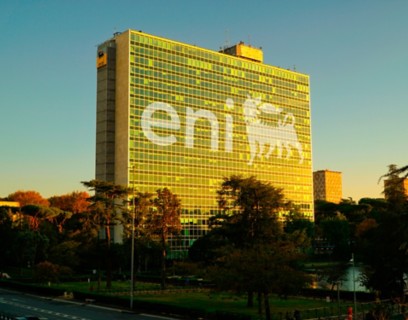Report‘s falsehoods about the projects in Kenya
The television programme “Report” contains numerous errors and inaccuracies.
In its 17 November episode, the Rai 3 television programme “Report” broadcast an item on the Mattei Plan that focused on the alleged negative impacts of Eni‘s project to produce agri feedstock in Kenya. The television programme contains numerous errors and inaccuracies.
According to Report, the case of the village of Mbegi – where dozens of farmers are reportedly dissatisfied with the progress of the castor oil cultivation – indicates the failure of the project.
THIS IS NOT THE CASE
In April 2023, a demonstration campaign took place in Nakuru County involving around 1900 farmers working a total of 2500 hectares. In particular, in the village of Mbegi, 150 farmers joined the castor-oil cultivation project and 120 started sowing on 58 hectares. Of these, 32 farmers have expressed dissatisfaction.
In view of the 30,000 farmers involved in the April 2023 demonstration campaign in Kenya, the 32 Mbegi villagers who expressed dissatisfaction represent around 0.1%. Therefore, the sample is statistically unrepresentative.
Agri feedstock cultivation projects, developed with the support of the Kenyan Ministry of Agriculture, now involve over 100,000 farmers across the country, and the number is growing.
According to Report, castor oil cultivation poisons soils and animals
FALSE
Castor cultivation is a globally established practice: more than 1.5 million tonnes of seeds are produced annually and castor oil production is at around 700-800 thousand tonnes per year.
The scientific literature does not show any cases of soil contamination due to castor oil cultivation. On the contrary: the castor bean has a high capacity to absorb pollutants from soils, so much so that the use of castor bean is being studied in Europe and Asia precisely as a way to decontaminate soils (phyto-remediation).
Finally, in Kenya and the other countries where Eni develops agri feedstock castor cultivation projects, farmers are properly trained about the fact that castor beans are not edible.
According to Report, farmers expected a payment per hectare and are dissatisfied with the profit
FALSE
Eni works with local companies that act as aggregators that, among other things, receive seed supplies from Eni to be used for sowing, make contracts with farmers to purchase the entire output, and provide agronomic services.
The contract between aggregator and farmer specifies that remuneration is based on the product delivered and not on the area cultivated.
The price the farmer receives is negotiated between the parties seasonally and is agreed, and thus fixed, before the beginning of the sowing season. In addition to payment for the entire harvested volume, the farmer also receives additional services, including land preparation, and seeds for the cultivation of castor plants. All the services provided by aggregators allow farmers to reduce their financial exposure to zero and avoid incurring expenses.
The 32 Mbegi villagers who expressed dissatisfaction cultivated an average of 0.4 hectares (4000 square metres) of land each, with an average yield of 100 kg per hectare, and an average output of 40kg per person and received payment for the product delivered in accordance with the terms of the contract with aggregators. Overall, farmers in Nakuru County achieved yields of 300 kg per hectare, with an average per capita area of 0.8 hectares (8000 square metres).
Eni constantly monitors the observance and application of contractual conditions to verify, among other things, the correct application of economic conditions regarding farmers, the requirements for obtaining sustainability certification, and compliance with safety regulations. With regard to the 2023 campaign in the village of Mbegi, the above-mentioned checks were carried out and did not reveal any divergences from the contractual conditions agreed between the parties.
According to Report, farmers were forced to uproot food crops in order to allocate all the land for castor cultivation
FALSE
Eni‘s agri feedstock production model does not compete with the food chain. Eni aims to make use of severely degraded land, promote rotational crops alternated with food production, and extracts value from forest and agro-industrial residues.
In particular, in Kenya, Eni promotes both cultivation on Arid and Semi Arid Land (ASAL) as defined by the local Ministry of Agriculture, in monoculture where the land is not suitable for food production, and through intercropping with traditional food crops where consociation is possible.
To date in Nakuru County, 80% of castor beans are grown through intercropping and the remaining 20% through monoculture.
Below are two photos of fields cultivated by farmers from the village of Mbegi, in which intercropping, complementing and not replacing cultivation for food purposes, is evident.
The entire production of vegetable oils is certified according to the European ISCC scheme. This involves sampling the entire supply chain of the process, including agri-hubs, aggregators and farmers, ensuring respect for the environment and human rights.
Eni has also signed an agreement with the International Labour Organisation (ILO), a UN agency, on the promotion and verification of workers‘ rights – in this case farmers.
According to Report, the agri-feedstock production project does not involve any agricultural experimentation
NOT TRUE
Eni has been conducting trials on several castor bean varieties in Italy and Kenya since 2022, followed by pilot projects in several other countries. The objectives of the trial are to verify the adaptability of the seeds in different countries and their production potential.
In Kenya, the trial made it possible to start a demonstration phase in early 2023 on about 27 thousand hectares, involving 23 thousand farmers, for field testing of the experimental inputs with the aim of selecting the most suitable seed varieties for each region.
Regarding the experimental phase, since 2022 Eni Kenya has been working closely with KALRO (Kenya Agricultural and Livestock Research Organization) and KEPHIS (Kenya Plant Health Inspectorate Service) the two authorities of the Ministry of Agriculture in charge of testing and proper introduction of the different seed varieties in the country [reports available on estimated yields, etc.].
The report broadcast on Mbegi village in Nakuru County refers to the demonstration phase in April 2023.
The results of the demonstration phases made it possible to start a full-field sowing campaign in the first quarter of 2024, involving more than 100,000 farmers on a total of 80,000 hectares. The development of the project, from the experimental phase to the demonstration phase, together with the optimisation actions implemented, e.g. the introduction of best agricultural practices, has led to a progressive increase in production yields in the current field sowing phase.
According to Report, farmers are exposed to risks and do not benefit from the project
FALSE
Farmers benefit from in-kind agricultural inputs and services needed to cultivate their fields and contribute to the production process through labour, receiving remuneration based on the yield obtained and thus a contractually agreed value per kilogram produced. There are no minimum production thresholds to be reached, and the farmer bears no costs. Eni guarantees market access by pledging to take all the output of each crop year, and bears the agricultural risk related to yields.
Report notes that out of nine pilot projects of the Mattei Plan, seven are in strategic countries for Eni in Africa and calls the Mattei Plan “the Descalzi Plan”
THIS IS NOT CORRECT
Eni‘s only project in the Mattei Plan is the production of agri feedstock in Kenya for biorefining.
The project, which started in 2021, supports Kenya’s agricultural supply chain and helps integrate the country into the transport decarbonization supply chain.
The project supports the achievement of Eni’s goals of integrated decarbonization of its entire company (Net Zero by 2050), and is central to Eni‘s strategy of vertical integration in the production of biofuels, a key lever in particular for the decarbonization of heavy transport.
Report refers to the $210 million loan – $135 million from the World Bank and $75 million from the Italian state – secured by Eni and asks how much went into the pockets of farmers
THIS IS ABSOLUTELY INCORRECT
In May 2024, Eni and the International Finance Corporation (World Bank Group) signed cooperation agreements for total financing of $210 million to support agri feedstock initiatives in Kenya. Under the agreement, IFC provides up to $135 million and the remaining $75 million comes from the Italian Climate Fund. Part of these funds are to support agri-feedstock processing in Kenya, including downstream supply chain support services to improve local farmers working capital management and productivity rates.
Once activated, the loan is to be repaid by Eni at market interest rates.
Q&A to Report of 17 November 2024
Eni was asked a series of questions by Report‘s editorial staff, which it answered in depth, but were ignored in the programme.
The Mattei Plan is a broad governmental political project that includes multiple areas of activity on the African continent.
The agri-feedstock project in Kenya – Eni‘s project in the Plan – was launched in 2021 through an agreement with local institutions to develop projects related to decarbonisation and biofuels, with a focus on the production of vegetable oils (agri feedstocks) for bio-refining. In view of the positive environmental and socio-economic impacts of the initiative even from its early stages, the project received support from the International Finance Corporation (part of the World Bank) and the Italian Climate Fund.
The initiative involves, among other things, collaboration with local farmers, who work their own land, and receive support in terms of inputs, mechanisation, logistics, certification and training.
The seeds are grown on degraded land and in rotation with food crops, helping to regenerate soil fertility. By harnessing the residues from agro-industrial supply chains, the project promotes the adoption of circular economy practices.
The initiative also contributes to local food security through the production and sale of feed and fertiliser from the by-products of vegetable oil extraction.
The project will ensure additional income for up to 200,000 smallholder farmers in Kenya and regenerate up to 200,000 hectares of farmland.
On the subject of the disputed waters between Kenya and Somalia, Eni has not carried out, nor plans to carry out, any exploration activities in the offshore blocks in question. Finally, Eni does not comment on international disputes.
As part of the vegetable oil production project in Kenya, issues emerged in several regions such as Nakuru where castor oil trees produced very little fruit. What happened? Have local farmers been given the right support?
The agricultural campaign in Kenya, which started in 2022, has so far involved about 80,000 hectares and 100,000 smallholder farmers in more than 20 counties, with a growing trend. To date, performance is in line with targets and there has been a gradual improvement in crop yields.
Castor production in the Nakuru area, which covers about 3,500 hectares and has about 2,700 small farmers involved in the project, is in line with that of other counties. On about 100 hectares in Nakuru County, where about 170 farmers are involved, a programme is underway to improve production compared to the first campaign thanks to the distribution of new seeds made available by the aggregator.
Eni‘s contracts with aggregators require them to provide support to local farmers in production activities.
In its dealings with local farmers, Eni was advised by an intermediary, the company SAFA. By what procedures was SAFA selected and what kind of engagement did it receive from Eni?
To develop the castor-oil supply chain in Kenya, Eni adopted a business model that involves the use of private and public aggregators/cooperatives to coordinate and manage small-scale local farmers.
SAFA is one of the aggregators operating in several counties in the country and was selected according to Eni‘s qualification process. Under the contract with the aggregators, Eni supplies castor beans for cultivation and purchases the seeds produced by farmers.
Has Eni audited the results produced by SAFA in its intermediation activities?
SAFA is an aggregator and does not act as an intermediary. The contract between Eni and SAFA includes clauses on verifying compliance with the terms of the contract.






















